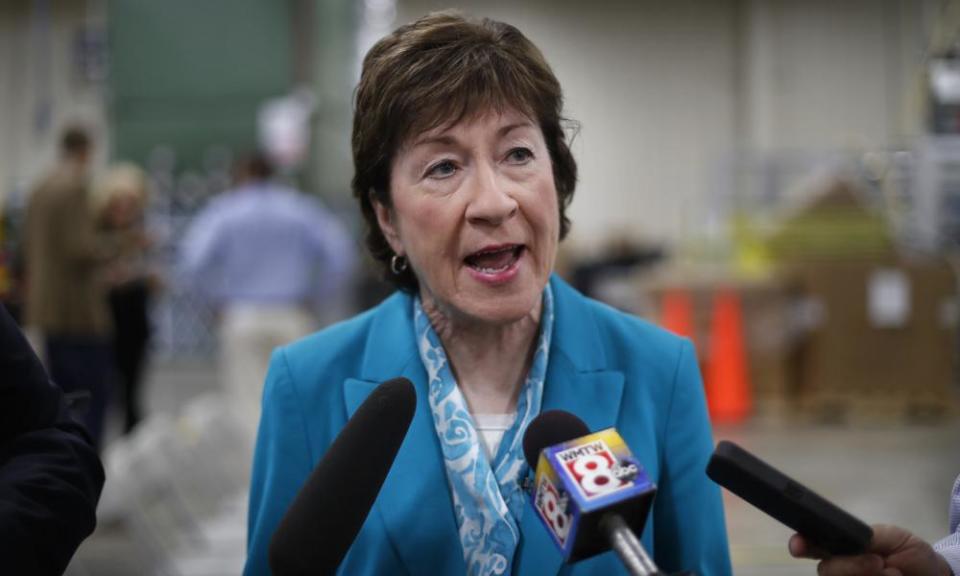Ted Cruz joins Republicans ranged against Graham-Cassidy healthcare bill
The effort to replace the ACA appears all but doomed as Cruz indicated Utah senator Mike Lee would follow him, while Maine senator Susan Collins told CNN it’s ‘very difficult’ for her to envision voting for the bill

The Trump administration’s latest efforts to replace the Affordable Care Act (ACA) appeared to be disintegrating over the weekend, as a growing number of Republican senators indicated they would vote against the so-called Graham-Cassidy bill.
Maine Republican Susan Collins looked all but certain to oppose the bill, while Texas senator Ted Cruz also warned on Sunday he would not vote for the legislation in its current form and said he believed Utah senator Mike Lee would follow his lead in opposing.
Republicans hold a slim 52-48 majority in the Senate, meaning they can only afford to lose two votes before the bill fails as all Democrats are expected to vote against. John McCain of Arizona and Rand Paul of Kentucky have already said they will oppose the bill, meaning one more Republican “no” will kill the legislation. Only a 50-50 tie can be broken by vice-president Mike Pence.
Collins, who voted against previous efforts to repeal the ACA, popularly known as Obamacare, told CNN’s State of the Union on Sunday it was “very difficult for me to envision a scenario where I would end up voting for this bill”.
The Maine senator said she was concerned the legislation would lead to “the erosion of protections for people pre-existing conditions” but was waiting for a final analysis from the Congressional Budget Office, which she expected on Monday, before making a definitive decision. She said: “I don’t know whether the CBO analysis will have new information that will change where I’m inclined to head.”
Highlighting the spectrum of Republican opposition, Cruz said later in the day he was opposed to the bill as it did not deregulate the system enough.
“Right now they don’t have my vote and I don’t think they have Mike Lee’s either,” he said, speaking at the Texas Tribune Festival in Austin. “I want to be a yes, I want to get there because I think that Obamacare is a disaster. But the price to getting there, I believe, is focusing on consumer freedom.”
Cruz said he and Lee had presented edits to the bill’s architects, South Carolina’s Lindsey Graham and Bill Cassidy of Louisiana, but they were taken out of the bill within a day.
Lisa Murkowski of Alaska, another who voted against the last effort to replace the ACA, has yet to declare a position.
Senate majority leader Mitch McConnell has been expected to bring the bill up for a vote before 30 September, as he looks to fulfil a seven-year Republican campaign promise. Appearing on NBC’s Meet the Press on Sunday, White House legislative director Marc Short said the vote would probably happen on Wednesday.
But Graham-Cassidy has prompted opposition across the political spectrum and in the healthcare sector. On Saturday, the American Medical Association, the Federation of American Hospitals, America’s Health Insurance Plans and the BlueCross BlueShield Association issued a joint statement against it.
The groups said Graham-Cassidy would cause patients to lose important protections and undermine those with pre-existing conditions; would implement “dramatic cuts” to Medicaid for vulnerable citizens; would make coverage more expensive; and contained “unworkable” timelines for implementation.
The statement read: “Healthcare is too important to get wrong. Let’s take the time to get it right. Let’s agree to find real, bipartisan solutions that make healthcare work for every American.”
On Sunday, Short insisted pre-existing conditions were covered by the new bill, saying so four times on NBC. On CBS’s Face the Nation, he said: “You’re right that there is an ability for states to apply for a waiver. But it’s conditional upon them showing how they will continue to make pre-existing conditions covered on an affordable basis. There’s also federal dollars that are provided to help states to do that.”
Treasury secretary Steven Mnuchin said that if the bill did fail in the Senate, the president would be open to negotiating with Democrats.
“To the extent they [Democrats] are willing to come to the table and fix it, the president would always listen,” Mnuchin told CNN.
The White House still hopes that Graham-Cassidy can progress, indicating that it will concentrate efforts on swinging the vote of Paul. Short told Fox News Sunday that the bill’s provision to defund Planned Parenthood, the nonprofit that provides reproductive healthcare, should be enough to sway the senator, a staunch abortion opponent.
“If Rand Paul is the final vote here, it’s hard to see how he can go to his support and say I had the chance to protect life [and voted against],” Short said.
Paul appeared on NBC. He indicated that his opposition to the bill centered around the proposed temporary block grants to the states that would replace Medicaid expansion funds contained in the ACA.
The proposal is a central building block in the bill and, according to numerous pieces of analysis, would significantly reduce federal healthcare funding, particularly for low-income Americans. Nonetheless, Paul, a conservative libertarian, argued that the grants would not go far enough.
“I started my political career campaigning against Obamacare,” he said. “I can’t in good conscience vote to keep it.”
Related:
For more news videos visit Yahoo View, available on iOS and Android.

